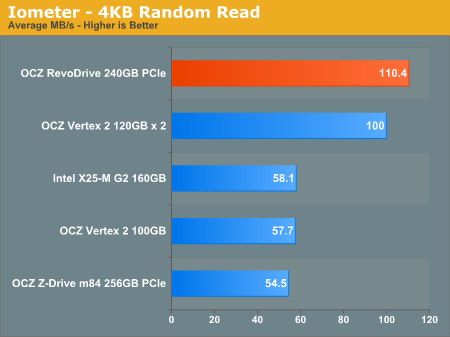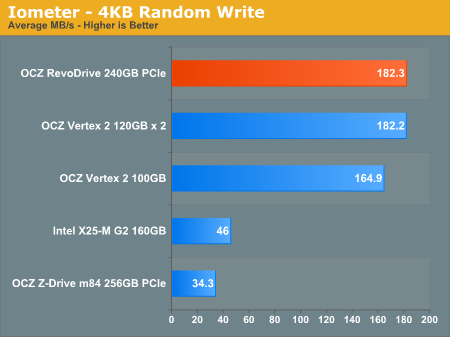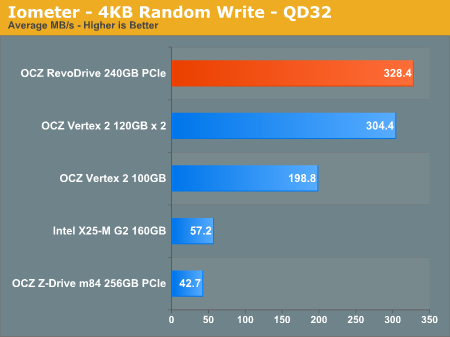OCZ's RevoDrive Preview: An Affordable PCIe SSD
by Anand Lal Shimpi on June 25, 2010 2:15 AM ESTRandom Read/Write Speed
This test reads/writes 4KB in a completely random pattern over an 8GB space of the drive to simulate the sort of random access that you'd see on an OS drive (even this is more stressful than a normal desktop user would see). I perform three concurrent IOs and run the test for 3 minutes. The results reported are in average MB/s over the entire time. All requests are 4KB aligned.

Compared to a single Vertex 2, the RevoDrive is nearly twice the performance. The Revo actually outperforms our two Vertex 2s in RAID-0 thanks to the controller on the card. This is more the exception rather than the rule however, Intel’s ICH10R is one of the fastest desktop SATA 3Gbps controllers we’ve ever seen.

At low queue depths random write performance doesn’t actually improve that much. A single Vertex 2 SSD is already running at close to peak performance here. Compared to last year’s more expensive Z-Drive m84 the performance improvement is tremendous.
Crank up the queue depth for a particularly intensive workload and you’ll see the RevoDrive separate itself from a single drive:

At over 300MB/s there’s no single SATA 3Gbps drive that could deliver this sort of performance. And honestly it’s in these high queue depth scenarios that the RevoDrive really shines. The majority of desktop users simply aren’t pushing this many IOs at a given time, but if you are the Revo won’t disappoint. A pair of Vertex 2s in RAID-0 won’t either. It all comes down to cost and preference.










62 Comments
View All Comments
MrBrownSound - Wednesday, August 25, 2010 - link
Should I be worried putting my OS on this drive? Also I have two steamy hot graphics cards, will a fan be needed?diqster - Sunday, September 26, 2010 - link
While you claim these PCIe SSDs are aimed at the enterprise market (they are), you didn't hit very many enterprise benchmarks or concerns. I'd like to see these things reviewed in any PCIe SSD review:1) Form factor. Can they fit in a half height or half length PCI slot? Putting this in tandem with spinning metal HD's in a 1U server would be ideal. Flashcache setups come to mind. The previous OCZ offerings failed miserably in this department as they're as long as some GPU cards.
2) You mentioned RAID controller, but no mention of a BBWC. A BBWC (like on the old OCZ R-Drive) would drastically speed up random writes. Enterprises are looking at flash to solve 2 problems, either random reads or random writes.
3) Enterprises don't care much about sequential I/O here. Very few things in a datacenter environment would use sequential I/O. For things like databases or key value stores, it's all random. Sure, video editing is sequential but it's neither enterprise (in most senses) nor is it very popular (number of DB's installed worldwide dwarfs number of video editors).
4) Addressing write lifetimes. Consumers can swap and replace these cards one at a time if they fail every 2 years. Doing that over installations of hundreds or thousands of these cards is rather hard. People want to know if they'll last. Again, a BBWC would help address some of these issues -- only letting the last write of 100 writes to a block go through.
If you want to be taken seriously, start reviewing stuff in an enterprise manner. As of now, these are consumer-based reviews of enterprise gear.